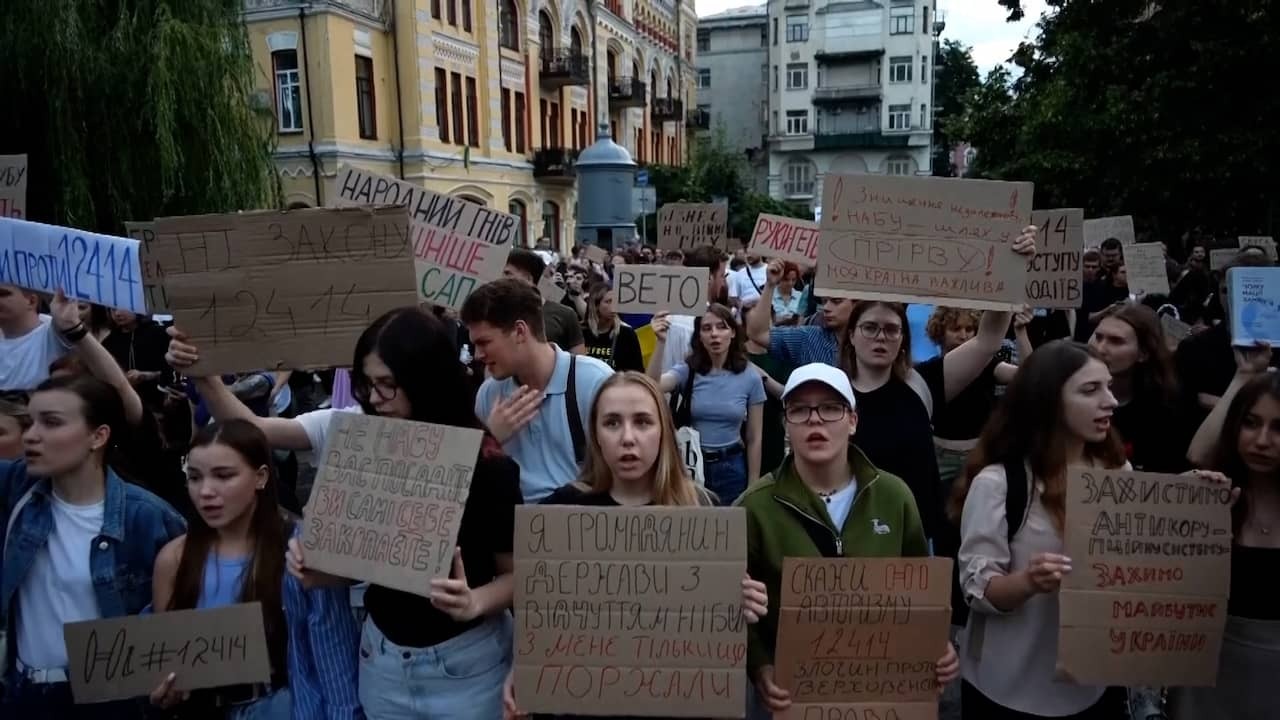
The Ukrainian President Volodymyr Zelensky is reversing a controversial law that limits the independence of two anti-corruption services. Zelensky announced on Wednesday that he would submit a new law to guarantee the independence of those agencies.
Zelensky announced the turnaround in his daily evening address to the Ukrainian people. In it, he said that he would submit a law to the Ukrainian parliament to guarantee the independence of anti-corruption services.
With this, he is reversing a law that he signed a day earlier and that he had pushed through the Ukrainian parliament with a large majority. This law placed two important anti-corruption services – NABU and SAPO – under the direct authority of the Prosecutor General. The latter is appointed by the president.
Critics believe that the president is thus getting far too involved in ongoing corruption cases. This led to the largest protests in Ukraine on Wednesday since the outbreak of the war with Russia, more than three years ago. Ukrainians went to the capital Kyiv to express their dissatisfaction.
Zelensky says he has heard the concerns that live among his people. “They are not falling on deaf ears,” he said. The president says he has adjusted what needs to be adjusted based on that. These adjustments are included in the law that he will submit. He emphasizes that independence standards are maintained.
 0:47
0:47
Hundreds of Ukrainians demonstrate against controversial Zelensky law
The announcement marks the end of a turbulent 24 hours, in which Zelensky’s government came under heavy pressure. There has been unrest within the government for some time and unity in Kyiv is under pressure. It was striking that the law was signed hastily and almost panicky, writes The Economist.
The question is therefore why Zelensky decided to sign the law, especially given Kyiv’s ambitions to one day join the European Union. The EU sets high standards for (candidate) member states in the area of combating corruption. Criticism from Brussels was therefore almost immediate on the decision to undermine the independence of NABU and SAPO.
Zelensky himself defended the law on the night from Tuesday to Wednesday by stating that investigations into corruption should be cleansed of “Russian influence”. He repeated this in his speech on Wednesday. “There will be no Russian influence or interference in the activities of law enforcement,” the president said.
It is obvious that excuses are being devised to justify the controversial law, experts tell NU.nl. László Marácz, professor of Eastern European Studies at the University of Amsterdam, says that it is unlikely that the controversial law is really aimed at Russian interference.
“There will certainly be Russian interference. But if that was really the reason for the law, there would be no demonstrations. The average Ukrainian suspects that something is wrong,” he says.
Marácz has suspicions about what this law has to do with. “There has been a lot of tampering with arms deliveries and funds. They have not ended up in the right places. People are afraid that that will become known.”
The law should therefore protect people, also thinks Nicolaas Kraft van Ermel-Nijland, lecturer in Eastern European History at the University of Groningen. “Zelensky will never be able to sell it that way,” he adds.
The fact that the law leads to so many protests has both advantages and disadvantages, say Marácz and Kraft van Ermel-Nijland. On the one hand, it emphasizes that Ukrainians are keenly aware of corruption in their country, says Kraft van Ermel-Nijland.
On the other hand, it can damage the much-needed unity in wartime, says Marácz. “Internal polarization is not good for support for Ukraine. Countries that are already critical of support, such as Hungary and Slovakia, will see this as confirmation of their position.”
The question is mainly: what now? The controversial law does not stand alone, writes The Economist. Its signing followed weeks of unrest in Zelensky’s government. Among other things, an anti-corruption activist was arrested and dozens of searches took place at the offices of NABU and SAPO.
Zelensky is now mainly focused on the future. “Our top priority remains maintaining national unity, stopping Russian evil and achieving dignified peace in Ukraine. And exactly as we all envision it, as a fully-fledged part of Europe. We will make it happen,” he concluded his speech on Wednesday.